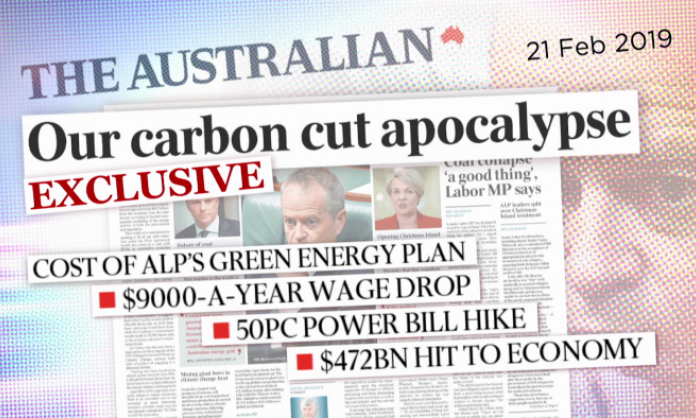For decades the right in Australia and around the world have argued that any serious shift away from fossil fuels would, in addition to massive job losses, result in a punishing rise in living costs. This has, perhaps, been their single most effective piece of propaganda—one that positions them as the champions of workers and the poor who will be most impacted by increases in the price of electricity and other essential goods and services.
So, for example, in the lead-up to the 2019 federal election, the Coalition launched a savage attack on the Labor Party’s (vastly inadequate) promises on emissions reductions and renewable energy. Energy Minister Angus Taylor described them as “economy wrecking”, citing (highly dubious) economic modelling showing Labor’s targets would result in a $472 billion hit to the economy, as well as big falls in real wages and a 58 percent increase in wholesale electricity prices. The Murdoch media was only too happy, of course, to help this scare campaign along, with headlines like “Our carbon cut apocalypse” splashed across the front page of the Australian.
Both in that specific case and in the longer term, the “stick with fossil fuels to protect living standards” argument has undeniably done its job from the right’s perspective. Surveys conducted over the past decade have consistently shown a majority of Australians want more serious action on climate, but sowing doubt about the possible impact of this on workers and the poor has helped give governments political licence, not just to sit on their hands, but to throw over $10 billion a year of public money at the fossil fuel industry to facilitate its continued expansion.
In 2007, when then Labor opposition leader Kevin Rudd famously described climate change as “the great moral challenge of our generation”, Australia produced 392.1 megatonnes (Mt) of coal and 49.5 billion cubic metres (Bcm) of gas. By 2020, coal output had increased 22.5 percent to 476.7 Mt, and gas was up 188 percent to 142.5 Bcm.
Australia has never been more awash with fossil fuels. According to the right’s logic, this should mean our wages are higher than ever and our energy prices lower. But, of course, that’s not what is happening. Real wages are falling at the fastest pace in a generation, and energy costs are going through the roof. In the coming months, as inflation and interest rates increase further, many Australians are likely to have to choose between heating their home and keeping up with their mortgage payments.
All this exposes the right’s argument about fossil fuels and living costs as the lie it has always been. The likes of Scott Morrison and Angus Taylor—and their propagandists in the Murdoch press—have never cared about whether some working-class, mortgage-stressed family in the suburbs might struggle with their power bills. Their arguments about our standard of living being threatened by a shift away from fossil fuels have been made to provide political cover for their real aim: ensuring that Australia’s mining magnates can continue to reap windfall profits from exporting massive quantities of coal and gas around the world.
Given how transparently cynical the whole thing is, it’s astonishing, on one level, that the very same arguments are being wheeled out again today in an attempt to justify expanding fossil fuel production even further. This time, the Liberals have focused their fire on Victorian Premier Daniel Andrews for implementing a moratorium on onshore gas exploration in the state between 2014 and 2021. Sussan Ley, the Liberals’ deputy leader and shadow minister for industry and skills, complained in a recent interview with Sky News that “the absolute refusal by Daniel Andrews to do anything about onshore gas exploration ... has I believe really contributed to the east coast problem”.
Of course the idea that, in the context of a 188 percent increase in gas production in Australia between 2007 and 2020, a few more gas mines in Victoria could “make or break” the whole east coast energy market is ludicrous. As Richie Merzian, climate and energy program director at the Australia Institute, put it, “Australia doesn’t have a gas supply problem; it has a gas export problem”. Energy prices aren’t going through the roof because there’s a genuine shortage of coal and gas in Australia. They’re rising because the major fossil fuel companies see no reason to hold down prices “artificially” by selling more of their product on the domestic market when there’s so much money to be made by exporting it.
The current energy crisis should be the wake-up call we need to get really serious about transitioning away from fossil fuels. The problem, however, is that the failure of the Labor Party to offer a credible plan to do that, and to ensure the interests of workers and the poor are looked after in the process, leaves the door wide open for the right to continue to gain a hearing for their big lie about climate action threatening living standards.
If the Labor government actually had a vision beyond being the B-team of Australian big business, there are numerous both short- and long-term fixes to the crisis. As a minimum, what’s needed is increased taxes on fossil fuel industry profits in particular and on big business and the rich more generally, and for the billions in additional revenue raised to be used to rapidly build up renewable energy capacity and to support those who may be impacted by job losses or increased energy costs during the transition.
There’s little hope, however, that the Labor Party will be prepared to take on the interests of the fossil fuel industry bosses in this way. And this, unfortunately, will only play into the right’s hands.









